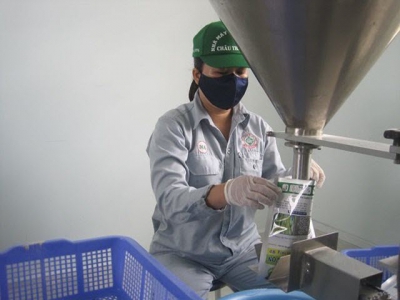Fertilizer, plant protection drugs threaten agriculture sector

A worker packs plant protection drug at a factory - PHOTO: TRUNG CHANH
CANTHO – Rising fertilizer and plant protection drug imports have placed extreme pressure on the agriculture sector of the country, specifically the Mekong Delta region, Nguyen Hong Tin at Can Tho University said.
Speaking at a seminar on the agricultural environment in the Mekong Delta region, held in Can Tho City on Friday, Tin said that the import value and volume of plant protection drugs have been on the rise since the 1980s.
“The use of these drugs has increased tenfold over the past 10 years,” Tin said.
In addition, fertilizer imports have swelled due to the increasing use of these chemical substances. In 2017, the volume of fertilizer imported into Vietnam totaled 4.6 million tons, worth US$1.2 billion, Tin stated. Of the volume, potash fertilizer accounted for 1.2 million tons, SA fertilizer made up over one million tons and DAP and NPK products accounted for more than 880,000 tons and 503,000 tons, respectively. Meanwhile, 500,000 tons of urea fertilizer was imported.
The amount of plant protection drugs used for crops rose to 2.5 kilograms per hectare for each crop. “Farmers use 2.5 kilograms of these drugs per crop, or 7.5 kilograms per hectare per year with three crops, meaning a huge amount of drugs being used on millions of hectares of land,” Tin remarked.
A recent survey found that some 40-70% of farmers used 10-30% more plant protection drugs than the permissible amount, while some 30% of farmers mixed various kinds of drugs in treating their crops.
“The problem is that farmers lack knowledge on how to use these drugs and the timeframe for using them, and they are unaware of those drugs being banned,” Tin said.
Tin pointed out that the overuse of plant protection drugs causes losses of some US$100 million for the Mekong Delta region each year.
The packages containing fertilizer and drugs being rampantly discarded have also caused environmental pollution, according to Tin. Water resources used for daily activities, irrigation and seafood farming are suffering the adverse effects of the overuse of plant protection drugs and fertilizer and their packaging, Tin said, adding that these chemical substances had reduced the fertility of the soil and gradually spoiled the soil environment.
Misuse of plant protection drugs and fertilizer has also put residents’ health at risk and shortened their life expectancy. Tin highlighted the increase in the number of cancer cases following the growth of fertilizer and plant protection drug imports as an example.
In terms of the economy, abusing these chemical substances for crops could drive up production costs and limit the competitiveness of the agriculture sector, leading to multiple products being returned by foreign importers, Tin stated.
Tin ascribed the strong increase in the use of fertilizer and plant protection drugs to a plan to boost the output of crops and productivity. Besides this, management, supervision and control of the use of fertilizer and plant protection drugs remain limited.
Related news
 Agricultural development in association with tourism
Agricultural development in association with tourism Under the Resolution of the 4th local Party congress for the 2015-2020 tenure, Phu Giao district’s Party Standing Committee has set an action program on
 Hoa Binh Biopharm JSC intensifies scientific application in agriculture
Hoa Binh Biopharm JSC intensifies scientific application in agriculture Located on a hill in Hoa Nghia Ward, Hoa Binh City, Hoa Binh Biopharm JSC has actively applied science in agriculture, especially medicinal herb farming.
 Agricultural by-products improve farmers’ income, benefit environment
Agricultural by-products improve farmers’ income, benefit environment The use of agricultural by-products for feeding livestock and as substrate for other crops has helped farmers around the country earn extra incomes